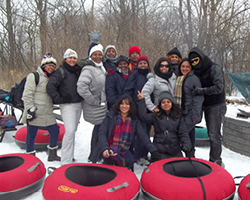The Panamá Bilingüe Program: Helping Panama Increase English Competency
- Susan M. Gass, Ph.D.
- University Distinguished Professor and Director, English Language Center
- Department of Linguistics and Germanic, Slavic, Asian and African Languages
- College of Arts and Letters
- Carol Wilson-Duffy, M.A.
- Outreach Specialist and Associate Director, English Language Center
- College of Arts and Letters

ESL teacher training students from the Panamá Bilingüe Program pose with Sparty at a baseball game.
President Juan Carlos Varela of Panama has a vision for a bilingual Panama. After his election in 2014, he set a goal for his five-year term of sending 500 public school teachers each year to the United States to study English and English language education. As a graduate of Georgia Technical Institute in Atlanta, President Varela has a great deal of respect for the American university system.
Panama and the United States have a century-long relationship, much of that centered on the construction and management of the Panama Canal. There is also a U.S. military base in Panama. Spanish is, of course, the country's primary language, and less than 20 percent of Panamanians also speak English. To graduate more high school students with command of the English language, the Panamanian Ministry of Education is working with a number of universities across the United States. Michigan State University through its English Language Center (ELC) is one of the institutions partnering with President Varela's Panamá Bilingüe program, and the ELC will soon welcome its fourth cohort of teachers from Panama since the partnership began last year.
English is a required subject in Panama's public schools, and the immediate goal of the Panamá Bilingüe program is to help Panamanian teachers of English develop tools for more effective teaching. This, in turn, is expected to lead to increased English competency among Panamanian students. High school graduates who can demonstrate a level of proficiency in English will have more opportunities for employment.
Carol Wilson-Duffy is the associate director of the English Language Center. She first heard of the program when Romelia Widders, assistant director for international admissions at MSU, returned from a recruiting trip to Panama.
"Romelia gave me the contact's name and phone number, and I reached out to them," Wilson-Duffy said. "I told them about our intensive English program and our solid English as a Second Language (ESL) teacher training program. We have completed trainings for the U.S. State Department as well as international governments and educational entities from South Korea and Saudi Arabia to China and Costa Rica."
Susan Gass, University Distinguished Professor and director of the ELC, believes the program makes an important contribution. Visiting teachers from Panama bring their own history and experiences to Michigan State, and their presence on campus creates learning opportunities for ELC faculty and staff. "The ELC has students from all over the world, but students from Central America have not made up a large percentage of our population," she said. "Therefore, having a group such as the students from Panama forces us to think differently about how we teach and how we integrate these students with the rest of our student population."

Panamanian public school teachers enjoy Michigan winter tubing.
The curriculum that the Panamanian teachers experience is crafted around their specific needs. "Each time we teach the group," Wilson-Duffy said, "we revamp and improve our curriculum because we learn more and more about their needs. Generally speaking, in ESL you develop a curriculum, and then when the participants arrive, you give them a placement test to learn about their skills." As the teachers progress through the program, MSU instructors continue to assess and refocus the curriculum.
The Panamanian teachers take ESL classes in reading and writing, speaking and listening, and vocabulary. They also take an ESL methods course. In addition to classroom learning, the participants visit local schools, take in shows, and visit area museums. During their eight weeks at MSU, Wilson-Duffy said, "they work tirelessly in class to grasp the methods and techniques we teach, but they also work diligently outside class on the many readings and research that are required."
Ifni Montilla is one of the Panamanian teachers who participated in the program. "Personnel from the Ministry of Education chose the different universities that Panamanian teachers would attend," she said. "Before selection, we had to take a seminar, and at the end of it we had to write an essay about the reasons we should be selected to go to United States." Montilla was glad to have been assigned to Michigan State. Her instructors challenged her, she said, and she felt motivated to give the program her best effort. Montilla currently teaches at Pedro Pablo Sanchez High School and at the University of Panama.
"When they go back to Panama they are expected to have improved both their language skills and their teaching methods," Wilson-Duffy said. "They often are asked to present the information and techniques they have learned here at MSU during Panamanian in-services and small conferences."
One of the things that sets Michigan State apart is that the ELC—a unit in the College of Arts and Letters—works closely with faculty from a number of other college units. There are working relationships with the M.A. TESOL program, the Second Language Studies (SLS) Ph.D. program, the Center for Language Education and Research (CLEAR), and the Center for Language Teaching Advancement (CeLTA).
"These centers and language teaching and research programs share the same new state-of-the-art workspace, which fosters frequent collaboration and sharing of ideas," Wilson-Duffy said. "The teachers in our training programs gain not only a practical perspective on teaching language, but since we are so closely linked with the other programs, they get a solid research perspective on second language acquisition and implementation of teaching strategies and methodology."
In January of 2015, addressing the first group of 500 teachers being sent to the United States, President Varela said, "I am convinced in the importance of managing the English language as a fundamental tool to increase competitiveness and social mobility in our country, through training prepared citizens to construct a better future and obtain jobs with better salaries being created by our economy."
- Written by Matthew Forster, University Outreach and Engagement
- Photographs courtesy of College of Arts and Letters